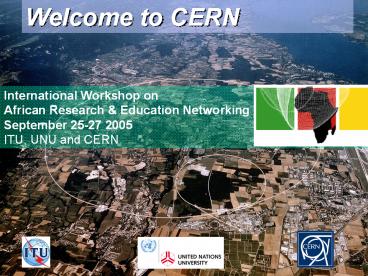Welcome to CERN - PowerPoint PPT Presentation
1 / 10
Title:
Welcome to CERN
Description:
The Organization shall have no concern with work for military requirements and ... fetching information from other places. It made sharing information so much easier ... – PowerPoint PPT presentation
Number of Views:37
Avg rating:3.0/5.0
Title: Welcome to CERN
1
Welcome to CERN
International Workshop onAfrican Research
Education NetworkingSeptember 25-27 2005 ITU,
UNU and CERN
2
Origin of CERN
- The Mission of CERN (1954)The Organization
shall provide for collaboration among European
States in nuclear research of a pure scientific
and fundamental character, and in research
essentially related thereto. - The Organization shall have no concern with work
for military requirements and the results of its
experimental and theoretical work shall be
published CERN Convention
3
CERN in Numbers
- 2500 staff
- 6500 users
- 500 Fellows and Associates
- Member States Austria, Belgium, Bulgaria, the
Czech Republic, Denmark, Finland, France,
Germany, Greece, Hungary, Italy, Netherlands,
Norway, Poland, Portugal, Slovakia, Spain,
Sweden, Switzerland and the United Kingdom. - Observers India, Israel, Japan, the Russian
Federation, the United States of America, Turkey,
the European Commission and Unesco
4
CERN collaborates with the Universities globally
732
4231 MS
722
100
30
50
1932 NMS
50
10
CERN 20 Member States 2400 staff500 fellows,
paid associates collaborates with around
500 institutes with 6500 scientists
5
The Web
- Was a response to the needs of a distributed
collaborating community - And saved time and effort in fetching
information from other places - It made sharing information so much easier
- CERN supports actions to make contents of
publicly funded education and research freely
accessible on the web, and to connect all
universities with sufficient bandwidth that they
can exploit this information. - Transparent access to information
- Independent of and removing barriers of space and
time
6
Why did CERN get involved in WSIS?
- United Nations Secretary-General Kofi Annan
issued a challenge to the worlds scientists to
address the clear inequalities in scientific
activities between advanced and developing
countries. - Present the vision with which most of these
technologies had been developed by the scientific
community ie publically funded research should be
openly available
7
(http//cern.ch/rsis )
Result Education, Training and Knowledge are
Keys to Development ICT are the means of storage
and access, make us virtual neighbours and enable
close collaborations of distant partners
8
RSIS
- Key themes that emerged from RSIS
- - that fundamental scientific information be made
freely available - - that the software tools for disseminating this
information be also made freely available - - that networking infrastructure for distributing
this information be established world-wide - - that training of people and equipment to use
this information be provided in the host nations - .
9
Objectives of the present workshop
- To enhance the capabilities of African academic
and scientific institutions to take advantage of
the opportunities associated with the emergence
of the global information society. - ? To strengthen collaboration between
academic and scientific institutions across
Africa and globally through exploring and
implementing various measures to improve network
connectivity and extend affordable and easy ICT
access and services. - ? To enhance cooperation with similar
planned and existing initiatives and networks by
promoting transparency, inclusiveness,
collaboration and efficiency.
10
Concrete objectives of the AFUNET workshop
- ? To consult with African universities on their
needs and objectives. - ? To build and strengthen collaboration with
these universities. - ? To compile a report based on the case studies
that gives a joint description. - ? Establish a common understanding of financial,
technical, services, organizational and content
issues. - ? Discuss and agree on the business principles
applicable in a future AFUNET. - Develop a strategic plan that describes the way
forward.































